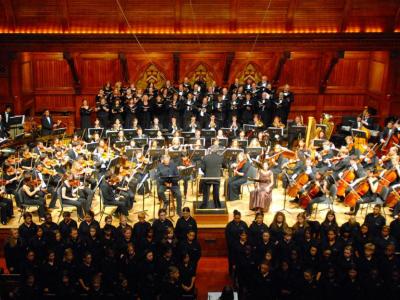What does a Music Director (Orchestra) do?
Music directors are experienced conductors who shape their orchestra's musical identity by selecting the performance repertoire for the season, molding the musical performances in rehearsal, hiring new players, commissioning new pieces from composers, soliciting guest conductors, and organizing ongoing community programs like composer residencies and young artist spotlights. In addition, music directors work with the general manager, business manager, and other senior staff to develop and implement long-term artistic, financial, and administrative plans for the orchestra.
Music directors are skilled instrumentalists and seasoned conductors who have worked tirelessly to develop their artistry, build a reputation, and ascend the ranks.
Music directors take on different responsibilities from moment to moment. In performing the role of conductor, music directors undertake rigorous study of the repertoire in order to prepare and lead the orchestra in performance. As artistic directors, they assume creative leadership of the entire organization, cultivating a vision for the orchestra's future and realizing that vision through thoughtful programming and oversight of the orchestra's administrative and business operations—including fundraising, which is of vital importance to all arts organizations. As the orchestra's public face and its representative in the community, music directors are expected to be advocates and ambassadors: adept at public speaking, dedicated to outreach, and passionate about maximizing the orchestra's impact outside as well as inside the concert hall.
At a Glance
Needless to say, this is a senior position with a symphony orchestra or opera company. Music directors are skilled instrumentalists and seasoned conductors who have worked tirelessly to develop their artistry, build a reputation, and ascend the ranks. Many find their start as assistant or associate conductors at regional orchestras, or as guest conductors working with various ensembles. From there, they land a full-time position as first conductor and then music director of a symphony orchestra. Advancement means being hired to lead a top orchestra in a big city, or becoming the artistic director of a larger music performance organization.
There are many, many varieties of music director, but this page deals specifically with those who work with symphony orchestras, chamber orchestras, and opera companies. Positions may be posted online, but it's safe to say that no candidate will get the job without the aid of a rock-solid reputation, established through word-of-mouth and networking.
- Broad knowledge of orchestral instruments
- Broad and deep knowledge of orchestral repertoire
- Conducting
- Hiring
- Administration
- Finance
- Public speaking
- Verbal communication
- Time management
- Networking
- Leadership
Charismatic, disciplined, passionate, driven, curious, confident, expansive, inspiring, and endlessly imaginative—these are a few of the traits that define an effective music director. Verbal communication and time management skills are essential in leading rehearsal.
While music directors might take care of administrative duties during traditional business hours in an office, at night and on weekends they're usually rehearsing or performing with the musicians. This is a consuming job that involves juggling a host of competing duties; bouncing between the rehearsal room, concert stage, private study, business office, conference room, and public appearances requires boundless energy, excellent time management abilities, and strong organizational skills.






